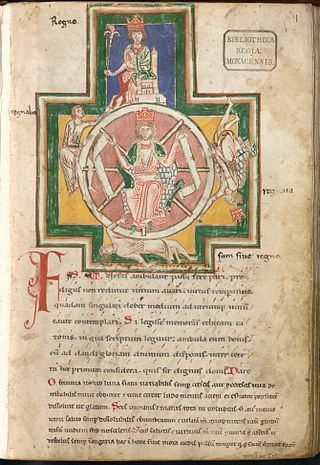
Carmina Burana is a manuscript of 254 poems and dramatic texts mostly from the 11th or 12th century, although some are from the 13th century. The pieces are mostly bawdy, irreverent, and satirical. They were written principally in Medieval Latin, a few in Middle High German and old Arpitan. Some are macaronic, a mixture of Latin and German or French vernacular.

Johann Augustus Eberhard was a German theologian and "popular philosopher".

Studentenverbindung is the umbrella term for many different kinds of fraternity-type associations in German-speaking countries, including Corps, Burschenschaften, Landsmannschaften, Turnerschaften, and Catholic fraternities. Worldwide, there are over 1,600 Studentenverbindungen, about a thousand in Germany, with a total of over 190,000 members. In them, students spend their university years in an organized community, whose members stay connected even after graduation. A goal of this lifelong bond is to create contacts and friendships over many generations and to facilitate networking. The Lebensbund is very important for the longevity of these networks.
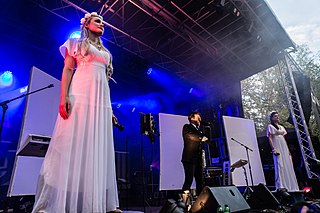
Welle:Erdball is a German band whose sound is distinguished by their intensive use of the Commodore 64's SID sound chip.
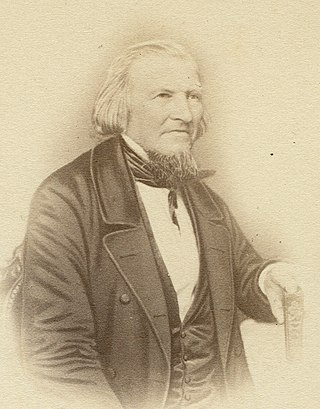
August Heinrich Hoffmann was a German poet. He is best known for writing "Das Lied der Deutschen", whose third stanza is now the national anthem of Germany, and a number of popular children's songs, considered part of the Young Germany movement.

Julius Sturm, German poet, was born at Köstritz in the principality of Reuss.

Academic Festive Overture, Op. 80, by Johannes Brahms, was one of a pair of contrasting concert overtures — the other being the Tragic Overture, Op. 81. Brahms composed the work during the summer of 1880 as a tribute to the University of Breslau, which had notified him that it would award him an honorary doctorate in philosophy.
"The Faithful Hussar" is a German song based on a folk song known in various versions since the 19th century. In its current standard form, it is a song from the Cologne Carnival since the 1920s.
Alle Jahre wieder is a well-known German Christmas carol. The text was written in 1837 by Wilhelm Hey. It is usually sung to a melody attributed to Friedrich Silcher, who published it in an 1842 song cycle based on a book of fables by Otto Speckter.
"Erika" is a German marching song. It is primarily associated with the German Army, especially that of Nazi Germany, although its text has no political content. It was created by Herms Niel and published in 1938, and soon came into usage by the Wehrmacht. It was frequently played during Nazi Party public events. According to British soldier, historian, and author Major General Michael Tillotson, it was the single most popular marching song of any country during the Second World War.
Volkslied is a genre of popular songs in German which are traditionally sung. While many of them were first passed orally, several collections were published from the late 18th century. Later, some popular songs were also included in this classification.
Vaterlandslied is the name of several patriotic German poems. The most famous one is "Ich bin ein deutsches Mädchen" written by Friedrich Gottlieb Klopstock in 1770 and dedicated to Johanna Elisabeth von Winthem.

Praxis pietatis melica is a Protestant hymnal first published in the 17th century by Johann Crüger. The hymnal, which appeared under this title from 1647 to 1737 in 45 editions, has been described as "the most successful and widely-known Lutheran hymnal of the 17th century". Crüger composed melodies to texts that were published in the hymnal and are still sung today, including "Jesu, meine Freude", "Herzliebster Jesu", and "Nun danket alle Gott". Between 1647 and 1661, Crüger first printed 90 songs by his friend Paul Gerhardt, including "O Haupt voll Blut und Wunden".

The ceremonial Landesvater is a German college custom developed in the 18th century, where student caps are pierced with the blade of a sword, during the recital of a particular song. The song that accompanies this event is also called 'Landesvater'. The word Landesvater is also used as a name for the prime ministers of the individual German states, or Länder.
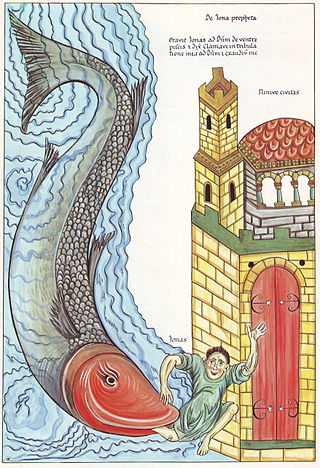
"Im schwarzen Walfisch zu Askalon" is a popular academic commercium song. It was known as a beer-drinking song in many German speaking ancient universities. Joseph Victor von Scheffel provided the lyrics under the title Altassyrisch 1854, the melody is from 1783 or earlier.
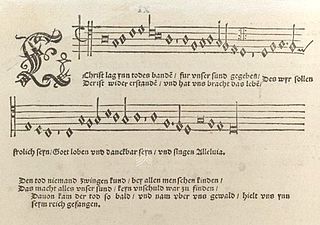
Eyn geystlich Gesangk Buchleyn, was the first German hymnal harmonised for choir, published in Wittenberg in 1524 by Johann Walter who collaborated with Martin Luther. It contains 32 sacred songs, including 24 by Luther, in settings by Walter for three to five parts with the melody in the tenor. Luther wrote a preface for the part books. The collection has been called the root of all Protestant song music.

"Gott sei gelobet und gebenedeiet" is a Lutheran hymn of 1524 with words written by Martin Luther who used an older first stanza and melody. It is a song of thanks after communion. Luther's version in three stanzas was printed in the Erfurt Enchiridion of 1524 and in Johann Walter's choral hymnal Eyn geystlich Gesangk Buchleyn the same year. Today, the song appears in German hymnals, including both the Protestant Evangelisches Gesangbuch, and in a different version in the Catholic Gotteslob.

Helmut Alfons Schlegel is a German Franciscan Catholic priest, meditation instructor, author, librettist and songwriter. He is known for writing new spiritual songs, set to music by various composers.
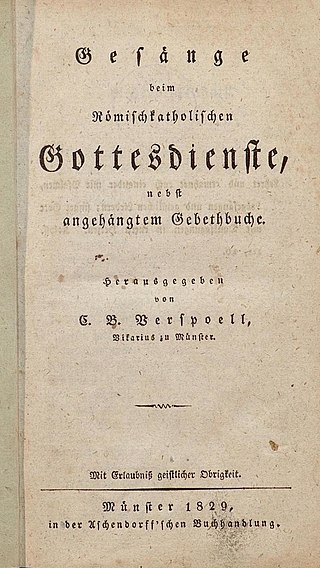
Christoph Bernhard Verspoell was a German Catholic priest, writer and hymnwriter. He published a hymnal with added melodies and organ settings in 1810. Some of his songs are still popular and part of the Catholic hymnal Gotteslob.
"Einer ist unser Leben" is a poem in five stanzas, written by Lothar Zenetti in 1973. It became a Christian hymn of the genre Neues Geistliches Lied (NGL) with a 1971 melody by Jean Liesse. The song is part of many hymnals, both Catholic and Protestant, and of songbooks, remaining popular in the 21st century.














